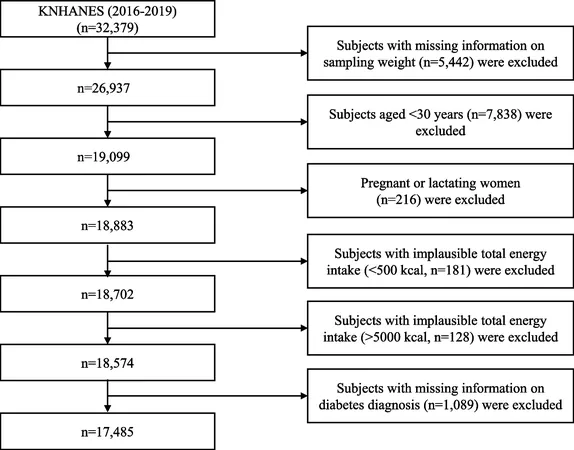
Assessing Nutritional Adherence in Korean Adults with Diabetes: A Wake-Up Call for Better Education
2024-09-27
Introduction
Nutrition plays an essential role in managing diabetes, and understanding how well individuals adhere to dietary recommendations is critical for developing effective education strategies. A recent study has highlighted the concerning state of nutritional adherence among Korean adults, revealing alarming statistics that underscore the need for improved nutrition education programs. By analyzing data from the Korean National Health and Nutrition Examination Survey (KNHANES) conducted between 2016 and 2019, the research offers significant insights into dietary practices relative to diabetes status.
Study Overview
The study included 2,793 participants (55.4% male), categorized based on their diabetes awareness and treatment status. The groups were as follows: "aware" (those diagnosed by a physician), "treated" (those on anti-diabetic medications), "controlled" (individuals with a HbA1c level below 6.5%), and "educated" (those who received nutritional education).
Key Findings
Results indicated a dire level of adherence to diabetes nutrition guidelines. In the "aware" group, a staggering 91.3% had not received any nutrition education, and overall adherence to recommended dietary intakes was alarmingly low across all groups. Notably, although individuals with diabetes showed marginally better adherence to total energy intake (59.6%) and sugar intake (88.0%) compared to those without diabetes (55.3% and 84.5%, respectively), the adherence to total carbohydrate intake was particularly concerning at just 34.3% among treated individuals.
The Need for Enhanced Nutritional Education
The findings emphasize the need for stronger nutrition education initiatives. Research has consistently shown that proper education can enhance dietary habits and improve health outcomes among people with diabetes. However, the current situation in Korea paints a picture of insufficient nutrition literacy, with many unaware of the critical role dietary management plays in their condition. Experts advocate for structured nutrition education delivered by registered dietitians, yet access remains limited and costly for many. The reliance on public health and community centers for nutrition education seems inadequate given the low rates of attendance—only 8.7% of those diagnosed with diabetes sought such education.
Implications of Dietary Patterns
The study furthermore reveals that traditional Korean dietary habits—often high in carbohydrates, low in fats, and high in sodium—could undermine nutritional education efforts. The dietary behavior trends suggest that participants are likely consuming high amounts of carbohydrates regardless of educational efforts aimed at reduction. This indicates an urgent need for more targeted educational programs that address these dietary norms and promote healthy alternatives, such as whole grains and increased vegetable intake.
Conclusion
The current analysis underscores a troubling trend: despite existing guidelines, many hard facts reveal that adherence to nutritional recommendations among Korean adults with diabetes is alarmingly low. To counteract these trends, there is an evident need for innovative and robust nutritional education programs that elevate awareness and empower individuals to take control of their dietary choices. Without immediate interventions, the aim of achieving optimal glycemic control through nutrition remains an uphill battle.
What’s Next?
As we look forward to further research, it’s clear that enhancing nutrition education could be the key to managing diabetes more effectively in Korea and beyond. The fight against diabetes isn't solely a medical one; it's a nutritional battle that requires significant attention and resources. Can we afford to ignore this pressing issue? The health and well-being of millions depend on the answers to these questions.


 Brasil (PT)
Brasil (PT)
 Canada (EN)
Canada (EN)
 Chile (ES)
Chile (ES)
 España (ES)
España (ES)
 France (FR)
France (FR)
 Hong Kong (EN)
Hong Kong (EN)
 Italia (IT)
Italia (IT)
 日本 (JA)
日本 (JA)
 Magyarország (HU)
Magyarország (HU)
 Norge (NO)
Norge (NO)
 Polska (PL)
Polska (PL)
 Schweiz (DE)
Schweiz (DE)
 Singapore (EN)
Singapore (EN)
 Sverige (SV)
Sverige (SV)
 Suomi (FI)
Suomi (FI)
 Türkiye (TR)
Türkiye (TR)